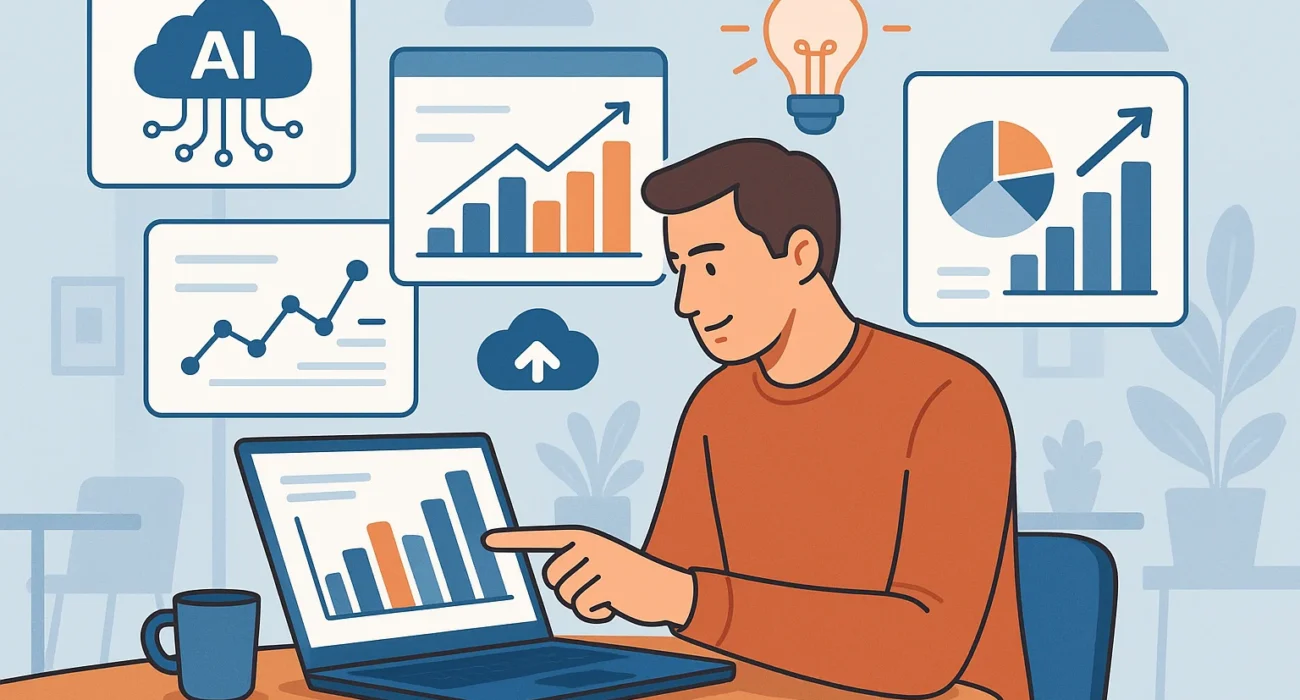Why Data Science Is No Longer Just for Big Corporations
Not long ago, data science seemed like a tool reserved for tech giants like Google or Amazon. But times have changed. Today, small businesses can also tap into the power of data science—without breaking the bank or hiring an entire analytics team.
By using accessible tools and simple strategies, even a local bakery or small eCommerce store can make smarter, data-driven decisions. In fact, small businesses that use data-driven strategies are 6 times more likely to see year-over-year profit growth, according to a recent McKinsey report.
What Is Data Science and Why Does It Matter?
Understanding the Basics of Data Science
Data science involves collecting, analyzing, and interpreting data to uncover valuable insights that guide decision-making. It combines statistics, machine learning, and data analysis to help businesses understand trends, predict outcomes, and optimize performance.
How Data Science Empowers Small Businesses
For small businesses, data science isn’t about complex algorithms—it’s about using available data (like customer purchases or social media engagement) to make smarter, faster, and more informed choices.
The Benefits of Data Science for Small Businesses
Better Decision-Making with Real Insights
Instead of relying on intuition, data science allows businesses to base their strategies on facts and measurable outcomes. Whether it’s understanding sales patterns or improving pricing, data removes the guesswork.
Personalized Marketing and Improved Customer Retention
With data analytics, businesses can identify customer preferences and tailor campaigns accordingly. Personalized recommendations can increase sales conversion rates by up to 25%.
Predictive Analysis for Growth and Risk Reduction
Predictive models can forecast demand, prevent inventory shortages, and reduce financial risks—all using historical data and trend analysis.
10 Easiest Ways Small Businesses Can Start Using Data Science
1. Start by Collecting the Right Data
Begin by tracking essential metrics—sales numbers, customer feedback, web traffic, and social media performance. Tools like Google Sheets or Airtable make this easy and affordable.
2. Use Free or Low-Cost Data Analytics Tools
You don’t need expensive software. Platforms like Google Data Studio, Zoho Analytics, and Power BI offer free versions perfect for beginners.
3. Analyze Customer Behavior and Preferences
Use customer data from your CRM or website analytics to identify buying habits. This helps tailor product recommendations and improve loyalty programs.
4. Use Data to Optimize Marketing Campaigns
By analyzing which ads, emails, or social media posts perform best, you can focus your budget where it drives the most results.
5. Leverage Social Media Insights
Facebook, Instagram, and LinkedIn all provide analytics dashboards that reveal your audience’s demographics, interests, and engagement trends.
6. Forecast Sales and Demand Patterns
Simple forecasting tools like Excel trendlines or AI-driven models can predict future sales and guide inventory planning.
7. Improve Operations and Inventory Management
Analyze order trends, supply times, and seasonal peaks to avoid stockouts or overstocking. This cuts waste and saves money.
8. Use AI Chatbots and Automation Tools
Tools like ManyChat, ChatGPT-based assistants, and Zapier automate customer service and data entry—saving hours of manual work.
9. Collaborate with Freelance Data Experts or Consultants
If your team lacks technical skills, hire freelance data scientists from platforms like Upwork or Toptal to set up dashboards and insights affordably.
10. Build a Data-Driven Company Culture
Encourage every employee to use data in their decisions. Even simple practices—like reviewing weekly performance reports—can foster a culture of analytical thinking.
Common Challenges and How to Overcome Them
Lack of Technical Expertise
Many small businesses fear data science because it seems too technical. Start small—use intuitive drag-and-drop tools before diving into coding.
Limited Budget for Tools and Training
Begin with free versions of analytics software and consider online courses from Coursera or DataCamp for low-cost learning.
Data Privacy and Security Concerns
Ensure compliance with data protection laws like GDPR by anonymizing personal data and using secure storage solutions such as Google Cloud or AWS.
Real-World Examples: Small Businesses Winning with Data Science
Example 1: Local Retail Store Using Predictive Analytics
A small boutique used sales and seasonal data to predict which items would sell best each month. As a result, they reduced unsold stock by 35% and improved profit margins.
Example 2: Restaurant Chain Using Data for Inventory Optimization
A local restaurant chain used simple spreadsheet analytics to monitor daily ingredient usage. This helped them cut food waste by 20% and improve cost efficiency.
FAQs About Data Science for Small Businesses
- Do I need to hire a data scientist to use data science?
Not necessarily. Many tools automate data analysis and visualization, making it easy for non-technical users. - What types of data should I collect first?
Start with customer data, website traffic, sales history, and social media metrics. - Is data science expensive for small businesses?
No. You can start free using tools like Google Analytics and Power BI, and scale later as needed. - How can data science help marketing?
It helps you understand audience behavior, track ad performance, and optimize campaigns for better ROI. - What skills should small business owners learn first?
Basic Excel analysis, data visualization, and Google Analytics are great starting points. - Can data science really make a big impact on small businesses?
Absolutely! Even small insights—like knowing your top-selling product or busiest day—can lead to significant revenue growth.
Conclusion: Turning Data into Decisions for Growth
Data science isn’t about having massive datasets or fancy algorithms—it’s about using what you already have to make smarter, evidence-based decisions. For small businesses, even simple steps like tracking customer preferences or analyzing sales patterns can make a big difference.
By starting small, using free tools, and building data-driven habits, any business can unlock the power of data science and set itself on the path to smarter growth and sustainable success.
